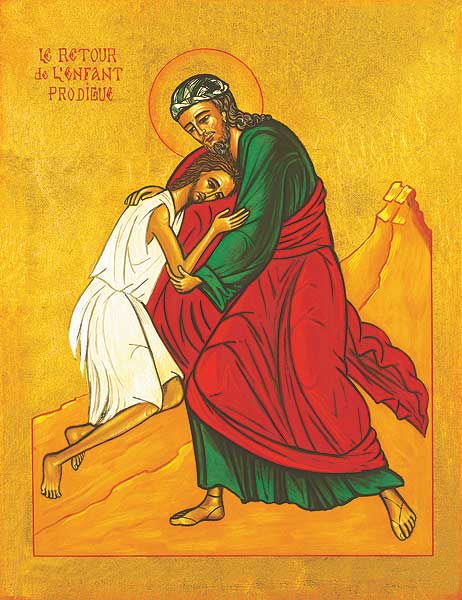 This icon recounts Jesus’ parable from Luke’s Gospel, commonly called the Prodigal Son.
This icon recounts Jesus’ parable from Luke’s Gospel, commonly called the Prodigal Son. Here we observe the moment when the younger son returns to his father in shame after squandering his inheritance. He had hoped to be accepted with the status of a servant. The father sees his approaching son from a distance, runs to him and embraces him. This scene of forgiveness and unconditional love is an original design by Sr. Marie Paul, but the way the scene is commonly depicted in Western art (e.g., the famous painting by Rembrandt) makes it immediately familiar to us.
Theology and Symbolism
We are told in the biblical story that the father embraced the prodigal son and kissed him. Here the head of the father is slightly bowed as if ready to kiss his lost child's head. The son, whose face shows deep guilt by icon standards, crumples in his father's arms. Because there is no weight given to the figures they become very flat. Yet the shape of the son (tapered at the head and feet, fuller in the middle) makes him appear to float. He kneels and yet is almost carried by his father. The full stance of the father, the diagonal flow of his outer garment and the supportive lines of the mountain peaks in the background give a solidity to image of the father--the strong figure to whom the remorseful son has returned. The contrast between the rags that the son wears and the thick drapery of the father is striking. The father's green garment is wrapped in red and he appears to take his son under its covering. This may be an allusion to Christ who is commonly depicted wearing blue wrapped in red to indicate divinity wrapped in humanity. There is a halo around the head of the father to symbolize sanctity. The son wears a torn, white tunic; white is symbolic of new life -- Christ wears white in his glorified state in iconography. This is fitting in light of the father’s announcement that his son "was dead and has come to life" (Luke 15:32b). (from Printery House)
“Once a person learns to read the signs of love and thus to believe it, love leads him into the open field wherein he himself can love. If the prodigal son had not believed that the father's love was already waiting for him, he would not have been able to make the journey home - even if his father's love welcomes him in a way he never would have dreamed of. The decisive thing is that the sinner has heard of a love that could be, and really is, there for him; he is not the one who has to bring himself into line with God; God has always already seen in him, the loveless sinner, a beloved child and has looked upon him and conferred dignity upon him in the light of this love.” ― Hans Urs von Balthasar, Love Alone is Credible
The Parable of the Missing Mother (& the Prodigal Son (Luke 15:11-32))
“I will always regret not being home the weekend of the explosion. I returned from my sister’s house to find an eerie quiet in the house, and my youngest son's empty room. "What have you done?" I accused the men who looked guilty. They were quick to list the charges against him. It had escalated beyond the usual skirmishes, perhaps because I wasn't there to settle it with a little humor, sometime apart, a good dinner. By the second week, the thrill of the combat had worn off. They were no longer boasting how they'd gotten the better of him and were starting to worry beneath the cool camouflage of unconcern. His absence was gnawing away at me; I longed for his quick tongue, the flashing fall of his laughter. He was young and naive; he'd never traveled alone. Was he safe? Had he been mugged along the road? How long would his money last? The questions prodded me awake in the middle of the night, as my husband snored beside me.
After a month, I noticed my husband taking long walks down the road, usually at twilight when there was no reason to work there. Was he starting to miss him as much as I did? It emerged in our talks that my husband recognized his own impetuosity in our younger son. They both had the nature of a spring storm: intense and fierce. They would hurl furious words, then all was calm. Except this time. No one had intervened; no one had suggested a time to cool off. My husband felt terrible about the damage done and grieved that the loss was permanent. It took a lot of talking, and he needed time to sit with his grief. But I think the incident made a deep impression. We agreed that if he ever did come home, we would not take him for granted again. We would love him for lightning flash and thunderbolt; then we would cradle him securely when the storm was spent.
After four months, I went searching. My husband seemed sunk in a stupor; the eldest son was sullen and depressed. If the youngest was ever to be found and brought home, it was up to me… By the time they found me, exhausted with the futile search, the wine had gone flat and the leftovers of fatted calf had congealed. No matter—both my boys were safe. I slept with a deep security I hadn't had in months. As I drifted off that first night home, I reviewed the story the servant had told me. According to her, the first sight of that unbathed boy galvanized his father. He ran down the road with the energy of his youth. The servants heard the pounding steps and shouting, so they rushed to see what was happening. He drowned the boy's apology in his huge embrace. I knew that my youngest had been enveloped in enormous arms, right there on the dusty road. When my husband called with exuberance for the ring and sandals, of course they were ready and waiting. As the serving woman brought the gold and leather, she heard my husband bellow, "This son of mine was dead and has come back to life; he was lost and is found."
Of course, tomorrow the euphoria will wear off and I'll have to deal with the eldest. He's still filled with the poison of resentment and I'll need to find out what's really causing his anger. But I don't know if I can top what my husband told him. The servant reported that he said, "You are with me always and all I have is yours." If that doesn't reassure the boy, I don't know what will. The words have been for me a lovely pillow, the cornerstone of our house, the surety of my husband's good heart…”
[from “Hidden Women of the Gospels,” Chapter 10, by Kathy Coffey, ©2003, Orbis Books]









